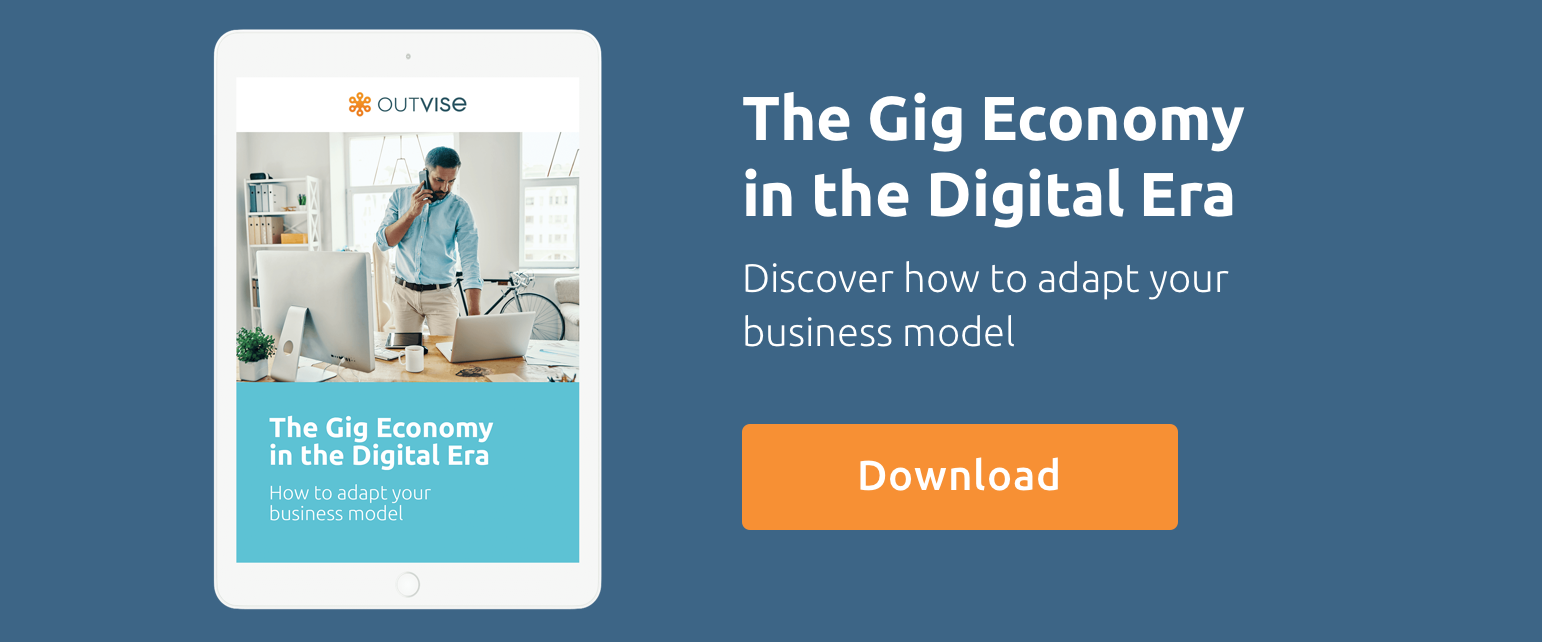There’s no doubt about it – digital is transforming the way we do business. Every day, new disruptive technologies emerge that heighten consumer expectations and intensify competition. Talent is crucial to keeping pace with this frenetic market, and subsequently, companies’ sourcing strategy needs to reflect the business environment. As such, the gig economy is proving to be an indispensable resource. In our recent paper ‘The Gig Economy in the Digital Era’ we discuss how employers can leverage the gig economy to meet the challenges of a digital world – discover the key points below.
Table of Contents
The importance of liquid talent in a digital world
Digital talent is in high demand – and currently, over half of employers globally report that they’re struggling to fill key positions. In response, companies have to reconfigure their personnel strategy. HR needs to be as agile as the market it aims to serve, which means adopting modern, creative approaches to recruitment. This means companies should seek to access ‘liquid talent’ – that is, individuals with a broad, multidisciplinary skill set that translates across projects and departments. In the opening remarks, we explore the liquid talent concept and its importance to modern businesses.
Why the gig economy is essential to sourcing liquid talent
Employers are struggling to make permanent hires with the skills they need for the digital world. As such, freelancers are a key source of the agile liquid talent that employers require. This is because talented people – particularly younger, digital-savvy individuals – favour freelancing. Such candidates are drawn to flexible, stimulating work that keeps them challenged instead of nine-to-five jobs. These characteristics are at the core of the liquid talent concept: people that actively seek out development opportunities, making them highly adaptable and fluid. In chapter 2, we drill down deeper into the fundamental connection between liquid talent and the gig economy.
How liquid talent facilitates digital transformation
Digital transformation is the process of implementing technologies to optimise business processes, culture and customer experiences. Thus, digital transformation is essential to maintaining relevance in a digital world – and strategic hires are essential to driving this objective. In the third chapter, we explain how businesses can efficiently and economically source the expertise they need to fulfill this ambition. By detailing the key stages and players in a digital transformation project, we explain how companies can streamline the journey towards meaningful, sustainable change.
How sourcing and recruitment options are evolving
Traditionally, substantial restructuring projects would have been spear-headed by management consultancy firms. However, today, businesses need to explore more agile, streamlined options. As technology enables greater access to varied types of digital talent, companies should adapt their HR strategy to reflect the turbulence of the employment market. With this approach, businesses can execute their digital transformation project in a way that reflects its aims. In the fourth chapter, we compare traditional management consultancy-driven approaches vs. hiring key experts.
Why talent platforms are essential to these aims
In the final chapter, we explain how businesses can get the most out of the gig economy. Certainly, hiring freelancers is a fast-track to implementing the agile principles that underpin digital transformation; however, using the right platforms is essential to properly meeting these goals. In conclusion, we explain how the most technologically-adept organisations are turning to specialist platforms like Outvise to source the talent they need. With industry-specific platforms, businesses can utilise user-friendly interfaces and smart matching tools to find the experts they need fast.
Stay ahead in a digital world
To respond to the challenges of a digital world, companies need to reflect the imperatives of a digitised market. They should experiment, adapt and innovate, with the aim of facilitating long-term, meaningful digital transformation that permeates to the core of company culture. To do this, companies need to connect to the liquid talent pool – and the gig economy is essential to this aim. Freelancers thrive in fast-paced, collaborative environments and therefore, incorporating this talent is essential to changing company culture.
To attract this talent, leadership needs to modernise their recruitment strategy. This means leveraging digital talent platforms to find key experts. Online talent platforms are the future of agile sourcing, connecting companies to a huge, diverse network of professionals. And, with industry-specific resources, businesses can access a selection of carefully curated, certified individuals that will help them meet their goals in a digital world. To learn more about the above in more detail, download the eBook now.
Alex Collart, CFO & Co-founder at Outvise. Serial entrepreneur and management consultant, with a focus on strategy and marketing. Has co-founded and exited several companies. Former McKinsey&Co associate. Industrial Engineer + MBA (IESE/Kellogg).






No comments yet
There are no comments on this post yet.